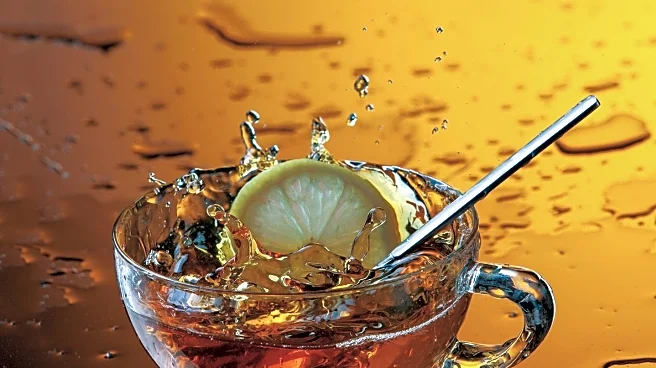What is the story about?
What's Happening?
Vermouth, traditionally known as a minor ingredient in cocktails, is experiencing a resurgence as a standalone beverage in U.S. bars and restaurants. This trend is observed in various establishments, such as Ombra in Lenox and Restaurant Beba in Montréal, where vermouth is served over ice with garnishes like orange slices and olives. The drink, which is an aromatized wine fortified with distilled spirits, is gaining attention for its herbal, slightly sweet, and bitter profile. Bartenders like Pablo Schor at Beba are tapping into nostalgia by offering vermouth in ways reminiscent of family traditions, such as 'vermouth batido' with citrus. The drink's newfound popularity is also evident in places like Dom's Taverna in Santa Barbara and Bar Siesta in Los Angeles, where it is served with pintxos and offered in flights alongside snacks.
Why It's Important?
The growing popularity of vermouth as a standalone beverage reflects a shift in consumer preferences towards more diverse and sophisticated drink options. This trend could impact the beverage industry by encouraging producers to innovate and expand their offerings. Smaller producers are already capitalizing on this interest by reviving traditional recipes and experimenting with unique botanical combinations. The rise of vermouth could also influence the cocktail culture, as it challenges the conventional roles of ingredients and encourages bartenders to explore new ways of serving drinks. This shift may benefit establishments that embrace the trend, attracting patrons seeking novel and nostalgic experiences.
What's Next?
As vermouth continues to gain traction, more bars and restaurants may incorporate it into their menus, potentially leading to increased production and variety in the market. Establishments might explore partnerships with producers to create exclusive blends, enhancing their appeal to customers. The trend could also inspire educational events, such as tastings and workshops, to familiarize consumers with the nuances of vermouth. Additionally, the beverage's popularity might prompt larger brands to invest in marketing campaigns to capture a share of the growing interest.
Beyond the Headlines
The resurgence of vermouth highlights broader cultural shifts towards valuing heritage and craftsmanship in food and drink. This trend aligns with a growing consumer desire for authenticity and connection to tradition, which could influence other sectors of the hospitality industry. The emphasis on nostalgia and family roots in vermouth's presentation may also resonate with consumers seeking meaningful experiences, potentially driving demand for similar offerings in other areas.















